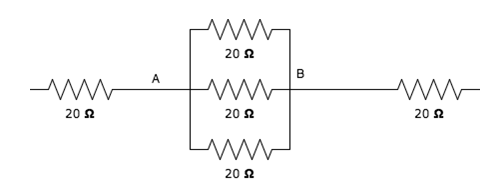Devices in Series and Parallel










Devices in Series and Parallel
Sometimes we come across a circuit which consists of more than one type of combination of resistance. That means some resistance may be parallel to each other and this combination can be in series with another resistance. Or we have different parallel combinations of resistance which are in series to each other. A combination circuit has some resistances connected in series combination and some parallel combination.
This type of combination is also called complex circuit. While solving problems of mixed combination of resistances, there are many points to be considered as given below:
|
Illustration: Consider the circuit diagram as shown in the figure then find the equivalent resistance of the circuit. |
 |
Solution: From the combination, it can be observed that are connected in series order. As current through
is same. So, their equivalent resistance is
Now, the given circuit can be redrawn as shown in the figure

Now, it can be seen that are in parallel combination. As, currents through
are different. So, their equivalent resistance can be calculated as below
Now, the given circuit can be redrawn as shown in the figure

Now, it is clear from the diagram that all the resistances are in series combination.
As, current through is same.
Equivalent resistance of the circuit is
The battery has potential as = 16 V
By using the formula V = IR
As current flowing through is same because they are in series. So
and potential drop across them is
As is an equivalent resistance for a parallel combination of
, So potential drop across them is the same
As is an equivalent resistance for a series combination of
, So current flowing through is the same i.e 0.67 A
In our houses all electrical devices operate on 220 V. It implies that- | |||
| Right Option : A | |||
| View Explanation | |||
In a circuit if two resistance of 3ohms each are connected in parralel and then connected in series with another combination of two resistance of 2 ohms which are connected in parallel then what is the net resistance of the circuit | |||
| Right Option : C | |||
| View Explanation | |||
Calculate the equivalent resistance between A and B | |||
| Right Option : C | |||
| View Explanation | |||
Students / Parents Reviews [10]
My experience with Abhyas academy is very good. I did not think that my every subject coming here will be so strong. The main thing is that the online tests had made me learn here more things.

Hiya Gupta
8thBeing a parent, I saw my daughter improvement in her studies by seeing a good result in all day to day compititive exam TMO, NSO, IEO etc and as well as studies. I have got a fruitful result from my daughter.

Prisha Gupta
8thMy experience was very good with Abhyas academy. I am studying here from 6th class and I am satisfied by its results in my life. I improved a lot here ahead of school syllabus.

Ayan Ghosh
8thIt was a good experience with Abhyas Academy. I even faced problems in starting but slowly and steadily overcomed. Especially reasoning classes helped me a lot.

Cheshta
10thAbhyas is a complete education Institute. Here extreme care is taken by teacher with the help of regular exam. Extra classes also conducted by the institute, if the student is weak.

Om Umang
10thAbhyas Methodology is very good. It is based on according to student and each child manages accordingly to its properly. Methodology has improved the abilities of students to shine them in future.

Manish Kumar
10thI have spent a wonderful time in Abhyas academy. It has made my reasoning more apt, English more stronger and Maths an interesting subject for me. It has given me a habbit of self studying

Yatharthi Sharma
10thAbout Abhyas metholodology the teachers are very nice and hardworking toward students.The Centre Head Mrs Anu Sethi is also a brilliant teacher.Abhyas has taught me how to overcome problems and has always taken my doubts and suppoeted me.

Shreya Shrivastava
8thOne of the best institutes to develope a child interest in studies.Provides SST and English knowledge also unlike other institutes. Teachers are co operative and friendly online tests andPPT develope practical knowledge also.

Aman Kumar Shrivastava
10thA marvelous experience with Abhyas. I am glad to share that my ward has achieved more than enough at the Ambala ABHYAS centre. Years have passed on and more and more he has gained. May the centre flourish and develop day by day by the grace of God.

